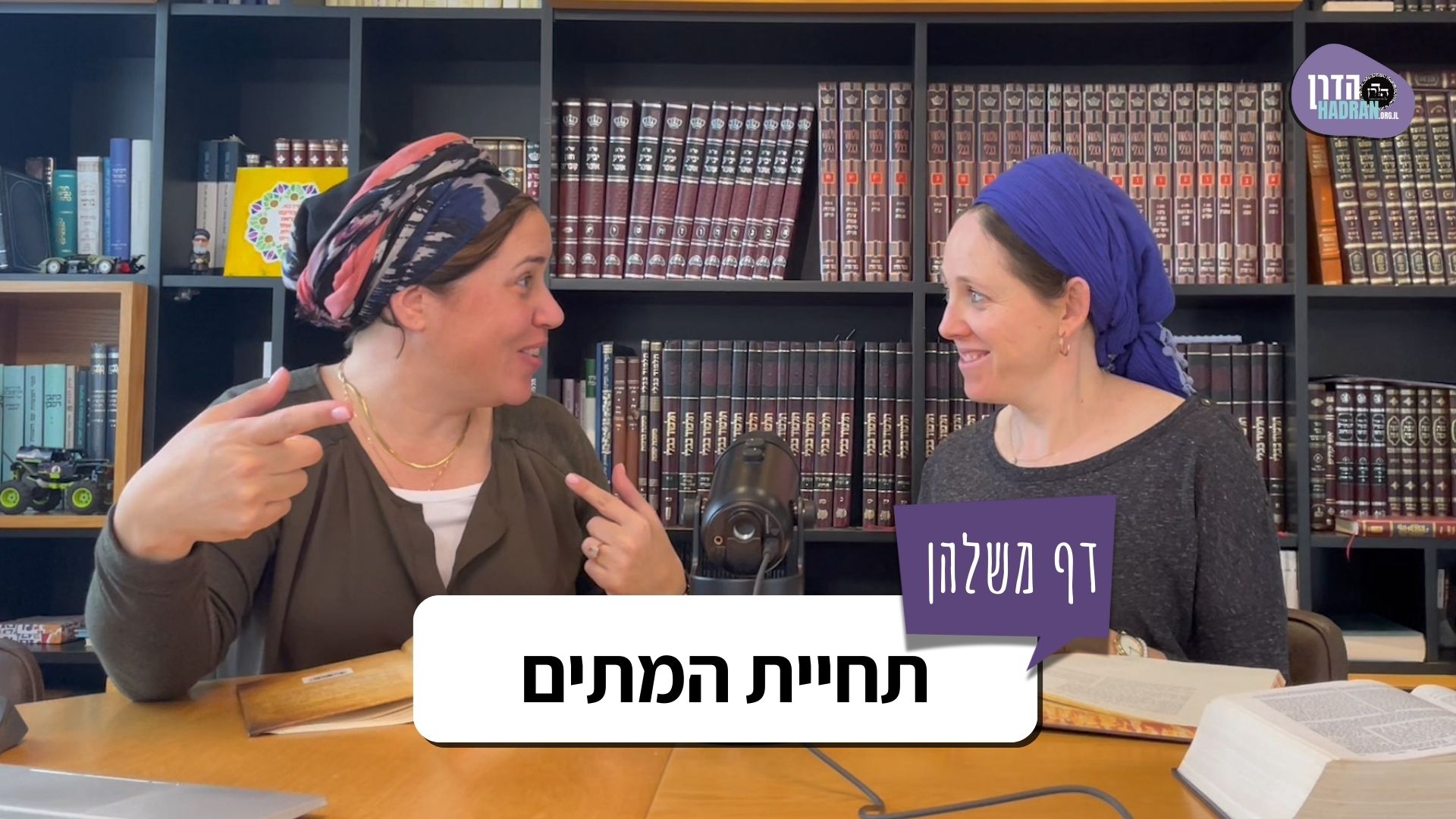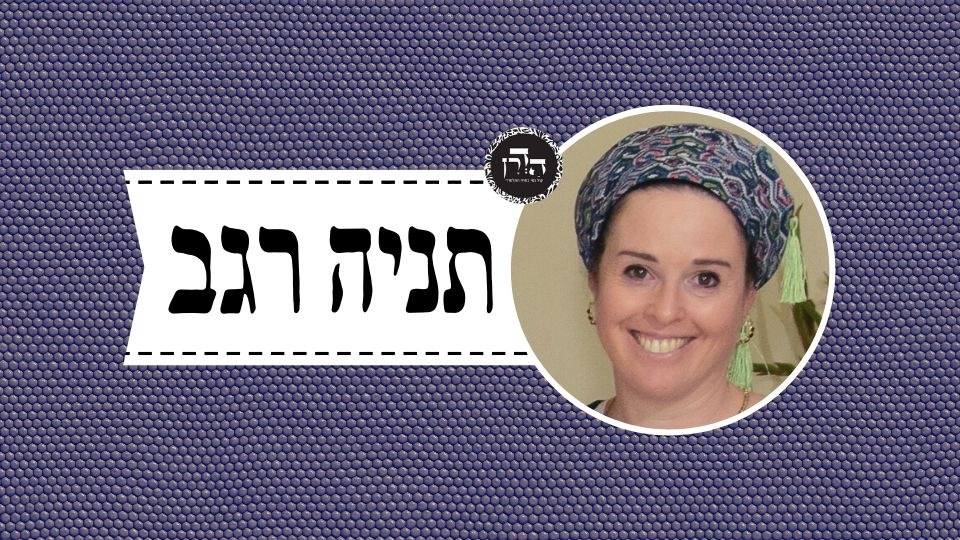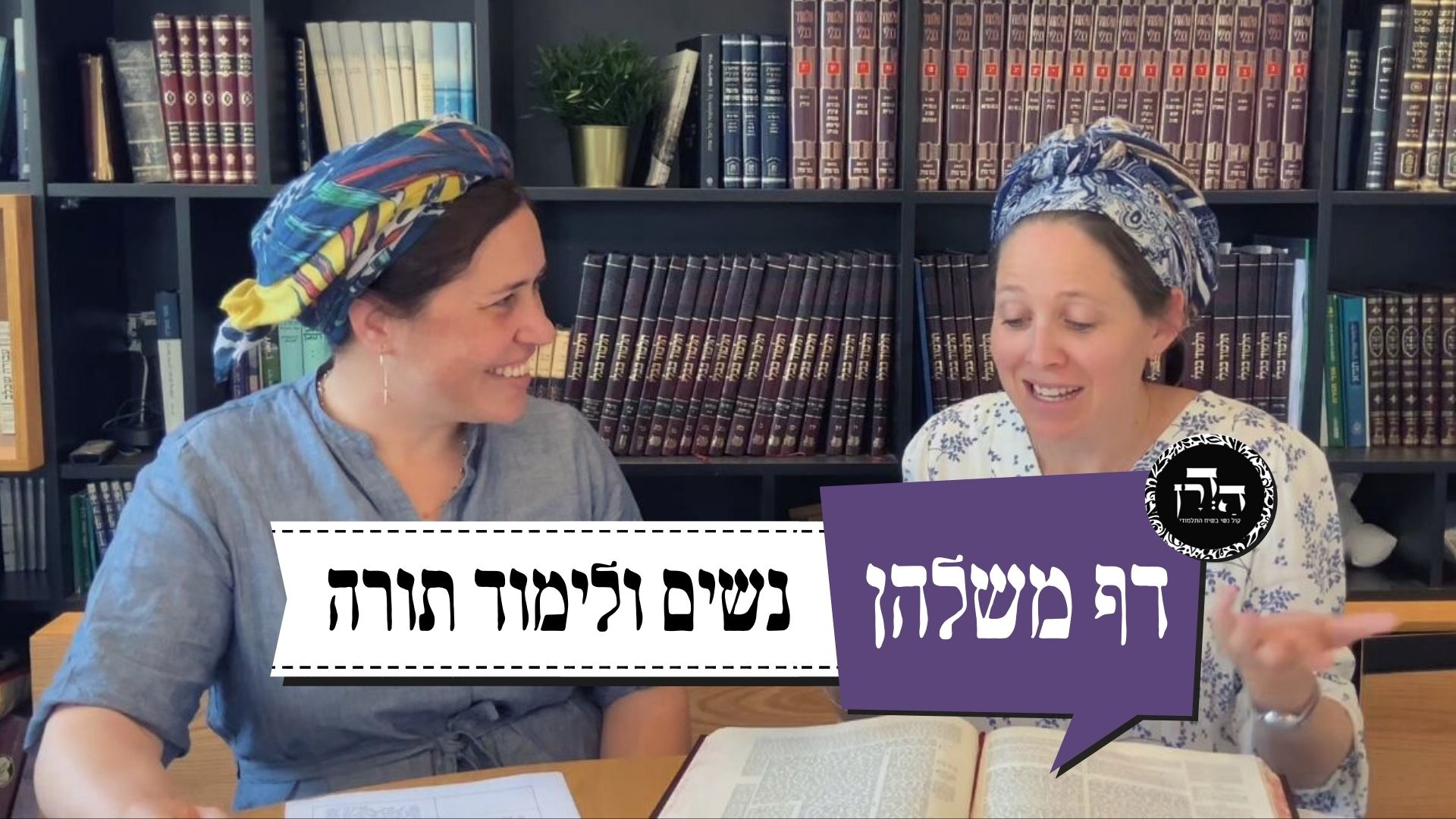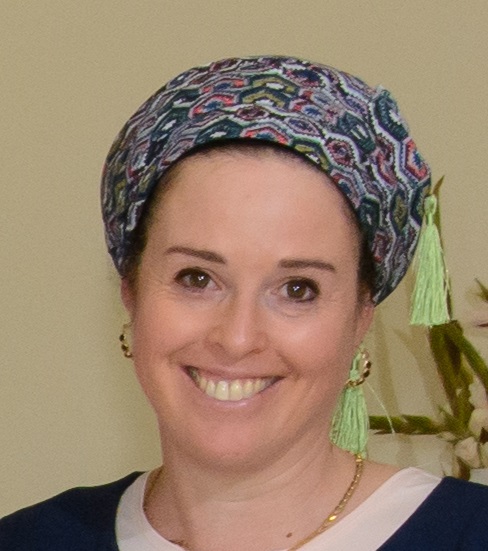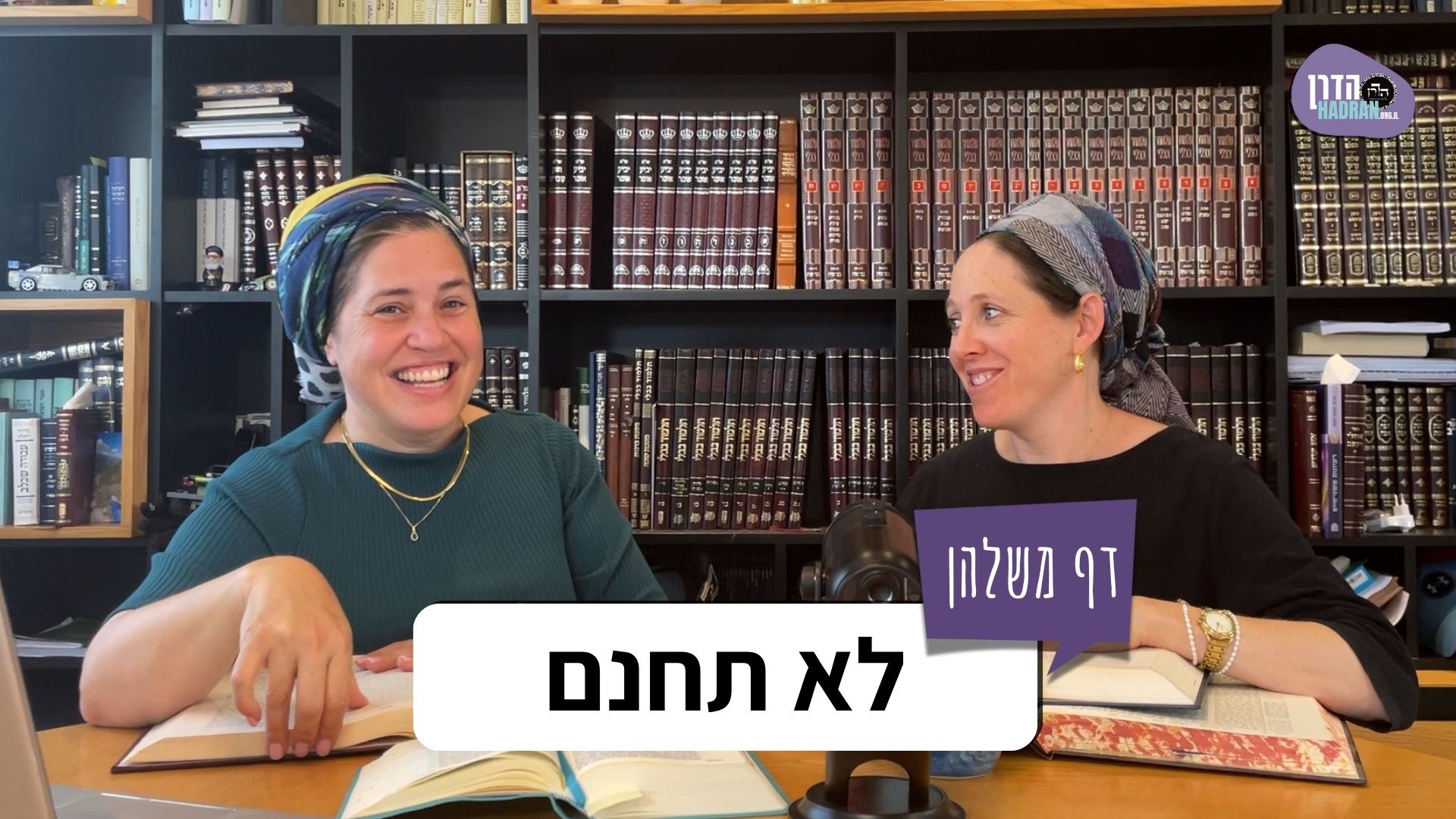מה הדין לגבי קן שעומד בראש אילן של הקדש או של אשירה? מאיזה עץ עשוי הקן שמדובר עליו והאם יש למקרה הזה קשר למחלוקת ריש לקיש ור’ יוחנן בקשר לעבודה זרה שנשתברה מאליה? כשגזברי המקדש קונים חפצים לשימוש במקדש, יש להם קדושה. אבל שמואל אמר שקונים בחול ומקדישים רק לאחר שנבנה. שתי דעות הובאו להבין את דבריו. והגמרא מקשה על כל דעה, ולאחת מהם ממשנתינו.
רוצה להקדיש שיעור?
כלים
העמקה
רוצה להבין מה באמת קורה מתחת לפני השטח של הסוגיה?
שיעורים, פודקאסטים והרחבות של מיטב המורות שלנו יפתחו לך עוד זוויות וכיווני חשיבה.
חדשה בלימוד הגמרא?
זה הדף הראשון שלך? איזו התרגשות עצומה! יש לנו בדיוק את התכנים והכלים שיעזרו לך לעשות את הצעדים הראשונים ללמידה בקצב וברמה שלך, כך תוכלי להרגיש בנוח גם בתוך הסוגיות המורכבות ומאתגרות.
פסיפס הלומדות שלנו
גלי את קהילת הלומדות שלנו, מגוון נשים, רקעים וסיפורים. כולן חלק מתנועה ומסע מרגש ועוצמתי.
מעילה יד
גְּמָ׳ אִיתְּמַר, עֲבוֹדָה זָרָה שֶׁנִּשְׁתַּבְּרָה מֵאֵלֶיהָ. רַבִּי יוֹחָנָן אָמַר: אֲסוּרָה. וְרֵישׁ לָקִישׁ אָמַר: מוּתֶּרֶת.
GEMARA: Connected with the mishna’s discussion of idol worship it was stated: In the case of an object of idol worship that broke by itself, Rabbi Yoḥanan says: It is prohibited to derive benefit from it, as the fact that it is broken does not constitute nullification, and Reish Lakish says: It is permitted to derive benefit from it.
רַבִּי יוֹחָנָן אָמַר אֲסוּרָה – דְּלָא בַּטְּלַהּ גּוֹי. וְרֵישׁ לָקִישׁ אָמַר מוּתֶּרֶת – מֵימָר אָמַר: הִיא גּוּפַהּ לָא מַצְּלָה, לְדִידִי מַצְּלָה לִי?
The Gemara clarifies their opinions: Rabbi Yoḥanan says it is prohibited, as a gentile did not nullify the object of idol worship, and its status is nullified only if a gentile broke it with the intention of nullifying it. And Reish Lakish says it is permitted, as it can be presumed that its gentile owner, upon seeing that it was broken, would have nullified it, saying to himself: If the object of idol worship could not even save itself from destruction, will it save me from harm?
אֵיתִיבֵיהּ רֵישׁ לָקִישׁ לְרַבִּי יוֹחָנָן: הַקֵּן שֶׁבְּרֹאשׁ הָאִילָן שֶׁל הֶקְדֵּשׁ – אֵין נֶהֱנִין וְאֵין מוֹעֲלִין. שֶׁבָּאֲשֵׁירָה יַתִּיז בְּקָנֶה.
Reish Lakish raised an objection to Rabbi Yoḥanan from the mishna: With regard to the bird’s nest that is atop the consecrated tree, one may not derive benefit from it ab initio, but if he derived benefit from it he is not liable for its misuse. In order to acquire a bird’s nest that is atop the tree worshipped as idolatry one should dislodge the nest by striking it with a pole.
מַאי לָאו דְּאִיתְּבַר מִגּוּפַהּ, וְקָתָנֵי, יַתִּיז בְּקָנֶה? לָא, דְּאַיְיתִי עֵצִים מֵעָלְמָא.
Reish Lakish analyzes the second halakha: What, is it not referring to a case where the nest was built from branches that broke off from the worshipped tree itself, and yet the mishna teaches: One should dislodge it by striking it with a pole? This indicates that branches that are broken off are permitted, despite the fact that they were not broken off by a gentile. Rabbi Yoḥanan responds: No, there is no proof from the mishna, as it is referring to a case where the bird brought branches from elsewhere, not from the worshipped tree itself.
אִי הָכִי, אַמַּאי שֶׁל הֶקְדֵּשׁ אֵין נֶהֱנִין וְאֵין מוֹעֲלִין?
Reish Lakish rejects this answer: If so, why does the mishna teach in the parallel case of a consecrated tree, where presumably the nest was likewise built of branches brought from elsewhere, that one may not derive benefit from it ab initio, but if one derived benefit from it he is not liable for its misuse? If the nest was built from non-sacred material, why is one not permitted to derive benefit from it ab initio?
אֶלָּא, בְּגִידּוּלִין הַבָּאִין לְאַחַר מִכָּאן, וְקָסָבַר אֵין מוֹעֲלִין בְּגִידּוּלִין.
The Gemara answers: Rather, the mishna must be discussing cases where the nest was constructed from branches that came from the tree in which it was built, and it is referring to growths of consecrated property that came afterward, i.e., after the property was consecrated. And the tanna of the mishna holds one is not liable for misusing growths of consecrated property, but it is prohibited to derive benefit from them ab initio.
הָכִי נָמֵי מִסְתַּבְּרָא, דְּאִי סָלְקָא דַעְתָּךְ דְּאַיְיתִי מֵעָלְמָא, אַמַּאי יַתִּיז בְּקָנֶה? לִשְׁקְלֵיהּ מִשְׁקָל!
The Gemara adds: This, too, stands to reason, that the mishna is referring to a case where the nest was built of branches from the tree in which it is located, as, if it enters your mind that the mishna is referring to a case where the bird brought the branches from elsewhere, why, in the case of the tree worshipped as idolatry, must one dislodge it from its place by striking it with a pole? Let him take it directly without using a pole.
אָמַר רַבִּי אֲבָהוּ, אָמַר רַבִּי יוֹחָנָן: לְעוֹלָם דְּאַיְיתִי מֵעָלְמָא, וּמַאי ״יַתִּיז״? יַתִּיז אֶפְרוֹחִים.
Rabbi Abbahu said that Rabbi Yoḥanan said in response to this question: Actually, the mishna is referring to a case where the bird brought the branches from elsewhere, and what is the meaning of the clause: One should dislodge? It does not mean he should dislodge the nest with a pole, but rather he should dislodge the chicks that are in the nest. Since it is difficult to take the chicks without climbing the tree, as they can move, there is more of a concern in this case that he might climb the tree, in which case he would be deriving benefit from it, which is prohibited.
אֲמַר לֵיהּ: רַבִּי יַעֲקֹב לְרַבִּי יִרְמְיָה אֶפְרוֹחִים כָּאן וְכָאן – מוּתָּרִין. בֵּיצִים, כָּאן וְכָאן – אֲסוּרִין. אָמַר רַב אָשֵׁי: אִם אֶפְרוֹחִים צְרִיכִין לְאִמָּן – כְּבֵיצִים דָּמוּ.
Rabbi Ya’akov said to Rabbi Yirmeya: With regard to chicks that can fly away and are not confined to this specific tree, both here and there, i.e., both in the case of a consecrated tree and in the case of a worshipped tree, it is permitted to derive benefit from them. But with regard to eggs, both here and there, it is prohibited to derive benefit from them, as they are dependent on the prohibited tree. Rav Ashi further says: If the chicks are young and still need their mother to survive they are considered like eggs, i.e., they have the same status as eggs and it is prohibited to derive benefit from them.
מַתְנִי׳ הַגִּזְבָּרִים שֶׁלָּקְחוּ עֵצִים – מוֹעֲלִין בָּעֵצִים, וְאֵין מוֹעֲלִין לֹא בַּשִּׁיפּוּיי וְלֹא בַּנְּבִיָּיה.
MISHNA: In the case of the Temple treasurers who purchased non-sacred logs to use for repairs in the Temple, one is liable for misusing the wood itself, but one is not liable for misusing the sawdust, nor is he liable for the leaves [baneviyya] that fall from the log, as the treasurers purchased for the Temple only those materials fit for use in its construction.
גְּמָ׳ אָמַר שְׁמוּאֵל: בּוֹנִין בַּחוֹל וְאַחַר כָּךְ מַקְדִּישִׁין.
GEMARA: Shmuel says that the method of construction in the Temple, for repairs or improvements, is as follows: One builds the structures in the Temple with non-sacred materials, and afterward consecrates those materials upon completion of the work.
מַאי טַעְמָא? מַאן דְּמִתְנַדֵּב מָעוֹת מַקְדֵּשׁ לְהוּ, דְּאָמַר: ״תֵּיחוּל קְדוּשַּׁת מָעוֹת אַבִּנְיָן״,
The Gemara asks: What is the reason that one does not consecrate the materials immediately? One who donates money for Temple maintenance consecrates the money and it is therefore subject to the halakha of misuse of consecrated property. Consequently, one may not use this money to purchase items for Temple maintenance, as the supplier would be liable for misuse as soon as he received the money as payment. The only way to use donations for Temple maintenance is if the Temple treasurer said that the sanctity of this money which was consecrated by the donor shall take effect on the completed structure, rather than on the construction materials or the wages of the artisans during the construction.
וִיהֵיב לְהוֹן לְאוּמָּנִין בִּשְׂכָרָן.
Therefore, once the construction is completed, the sanctity is transferred from the money to the structure, and then the money is non-sacred. And at that point, the Temple treasurers give the money to the artisans and the suppliers as their wages.
מֵיתִיבִי: מוֹתַר הַקְּטֹרֶת מָה הָיוּ עוֹשִׂין בּוֹ? הָיוּ מַפְרִישִׁין מִמֶּנָּה שְׂכַר הָאוּמָּנִין.
The Gemara raises an objection from a mishna (Shekalim 4:5): With regard to the incense left over from the previous year, which could no longer be used, what would they do with it in order to render it usable again? The Temple treasurers would set aside an amount of it equal to the value of the wages of the artisans who worked in the Temple.
וּמְחַלְּלִין אוֹתָהּ עַל מְעוֹת הָאוּמָּנִין, וְנוֹתְנִין אוֹתָהּ לָאוּמָּנִין, וְחוֹזְרִין וְנוֹטְלִין אוֹתָהּ מִתְּרוּמָה חֲדָשָׁה.
And they would then desacralize that incense by transferring its sanctity to non-sacred money in the amount owed to the artisans. And they would subsequently give the incense to the artisans as their wages. And finally, they would return and buy back the incense from the artisans with funds from the new collection of shekels, so that the incense would now be considered to have been acquired from the shekels of the current year.
וְאַמַּאי? לַיחֲלַיהּ אַבִּנְיָן!
The Gemara explains its objection: But why was this procedure necessary according to Shmuel, who maintains that one builds the structures in the Temple with non-sacred materials? Let them desacralize the leftover incense by transferring its sanctity to the completed, non-sacred structure, thereby consecrating it with the sanctity of the incense. After the leftover incense is desacralized, it can be given to the artisans as wages and the Temple treasurers can buy it back with funds from the new collection.
דְּלָא אִיכָּא בִּנְיָן. וְהָא ״מְעוֹת הָאוּמָּנִין״ קָתָנֵי! דְּלֵיכָּא בִּנְיָן כְּשִׁיעוּר מָעוֹת.
The Gemara explains: The mishna is referring to a situation where there is currently no ongoing construction in the Temple, and therefore there is no structure to which they can transfer the sanctity of the leftover incense. The Gemara raises a difficulty: But the mishna teaches: The wages of the artisans, which indicates that construction is taking place in the Temple. The Gemara responds: Although there is indeed ongoing construction, the mishna in Shekalim is referring to a case where there is no construction equaling the amount of the value of the leftover incense. Therefore, it is not possible to transfer the sanctity of the leftover incense to the construction.
וְהָאָמַר שְׁמוּאֵל: הֶקְדֵּשׁ שָׁוֶה מָנֶה שֶׁחִילְּלוֹ עַל שָׁוֶה פְּרוּטָה – מְחוּלָּל! הָנֵי מִילֵּי דְּאִי עֲבַד, לְכַתְּחִלָּה – לָא.
The Gemara raises a further difficulty: But doesn’t Shmuel say with regard to consecrated property worth one hundred dinars that if the Temple treasurer redeemed it for an object worth only one peruta, it is redeemed, despite the fact that the redemption was performed with an item that was not worth the full value of the consecrated property? The Gemara answers: This statement of Shmuel applies to a case where one did so, i.e., it applies only after the fact, but the Temple treasurer should not act in this manner ab initio.
רַב פָּפָּא אָמַר: הַיְינוּ טַעְמָא דְּבוֹנִין בַּחוֹל – לֹא נִתְּנָה תּוֹרָה לְמַלְאֲכֵי הַשָּׁרֵת, אִמְרֵי דִּלְמָא בָּעֵי לְמִיזְגָּא, וּזְגָא עֲלַיְיהוּ. אִי בְּנָא בְּקוּדְשָׁא – אִישְׁתְּכַח דְּקָמָעֵיל בְּקוּדְשָׁא.
Rav Pappa said: This is the reason that one builds the structures in the Temple with non-sacred materials and afterward consecrates those materials upon completion: It is because the Torah was not given to the ministering angels, who do not tire and do not have physical needs, but rather to human beings. Therefore, the Sages said that perhaps an artisan will want to rest and sit on the stones being used in the construction, and he might in fact sit on them. And if he builds with consecrated materials, it will be found that he misused consecrated property. Consequently, it is preferable for one to build with non-sacred materials, and the structure should be consecrated only upon completion.
תְּנַן: הַגִּזְבָּרִין שֶׁלָּקְחוּ אֶת הָעֵצִים – מוֹעֲלִין בָּהֶן, וְאֵין מוֹעֲלִין לֹא בַּשִּׁיפּוּיי וְלֹא בַּנְּבִיָּיה.
The Gemara raises an objection to this reasoning from that which we learned in the mishna: In the case of the Temple treasurers who purchased non-sacred logs to use for repairs in the Temple, one is liable for misusing the wood itself, but he is not liable for misusing the sawdust, nor is he liable for misusing the leaves that fall from the log.
וְאַמַּאי מוֹעֲלִין בָּהֶן? הָכָא נָמֵי לֶיעְבַּד בַּחוֹל, אָמְרִי דְּדִלְמָא בָּעֵי לְמִיזְגָּא, וּזְגָא עֲלֵיהֶן, וְאִישְׁתְּכַח דְּקָא מוֹעֵל בְּקָדָשִׁים!
But why should this be a situation where one could be liable for misusing the wood? Here too, let him work with non-sacred logs and consecrate them only after they have been fixed in the structure. After all, in this case too one can apply the above reasoning that the Sages said that perhaps he will want to rest and sit on the logs he is working with, and he might sit on them, and it will be found that he misused consecrated items.
אָמַר רַב פָּפָּא: אִי בְּעֵצִים דְּמִכָּאן וְאֵילָךְ, הָכִי נָמֵי. אֶלָּא כִּי תְּנַן בְּמַתְנִיתִין, בְּעֵצִים דְּיוֹמֵיהּ.
Rav Pappa said that if the mishna were referring to logs that the Temple treasurers acquired for use in construction from this point forward, then indeed they should not be consecrated until they are fixed in the structure. But when we learned in the mishna that one is liable for misuse of the wood, the tanna was referring to logs acquired for use on that same day. Since they are meant to be used immediately, there is no concern that one might sit on them.
הַדְרָן עֲלָךְ וְלַד חַטָּאת


